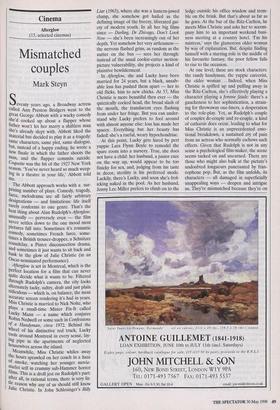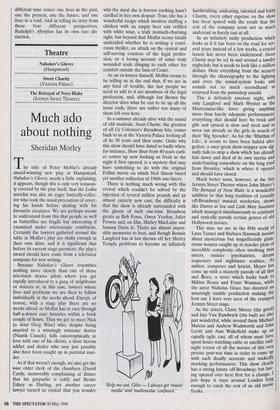Cinema
Afterglow (15, selected cinemas)
Mismatched couples
Mark Steyn
Seventy years ago, a Broadway actress called Ann Preston Bridgers went to the great George Abbott with a wacky comedy she'd cooked up about a flapper whose father won't let her marry a shiftless man she's already slept with. Abbott liked the material but decided to play it as a tragedy: same characters, same plot, same dialogue, but, instead of a happy ending, he wrote a new finale in which the father shoots the man, and the flapper commits suicide, Coquette was the hit of the 1927 New York Season. 'You've never heard so much weep- ing in a theatre in your life,' Abbott told me, The Abbott approach works with a sur- prising number of plays. Comedy, tragedy, farce, melodrama are all fairly arbitrary designations — and limitations: life itself rarely conforms to one genre. That's the best thing about Alan Rudolph's Afterglow: unusually — perversely even — the film never settles down to the one mood most pictures fall into. Sometimes it's romantic comedy, sometimes French farce, some- times a British trouser-dropper, a Schnitzer roundelay, a Pinter disconnection drama, and sometimes it just wants to sit back and bask in the glow of Julie Christie (in an Oscar-nominated performance). Afterglow is set in Montreal, which is the Perfect location for a film that can never quite decide what it wants to be. Filtered through Rudolph's camera, the city looks alternately tacky, sultry, drab and just plain ridiculous — which is, on balance, the most accurate screen rendering it's had in years. Miss Christie is married to Nick Nolte, who plays a small-time Mister Fix-It called Lucky Mann — a name which conjures Robin Nedwell or some such in Confessions of a Handyman, circa 1972. Behind the wheel of his distinctive red truck, Lucky tools around Montreal in every sense, lay- ing pipe in the apartments of neglected housewives across the island.
Meanwhile, Miss Christie whiles away the hours sprawled on her couch in a haze of smoke, watching her younger movie- starlet self in crummy sub-Hammer horror films. This is a droll jest on Rudolph's part: after all, in rational terms, there is very lit- tle reason why any of us should still know Julie Christie. In John Schlesinger's Billy Liar (1963), where she was a lantern-jawed clump, she somehow got hailed as the defining image of the breezy, liberated gai- ety of modern youth. In all her big films since — Darling, Dr Zhivago, Don't Look Now — she's been increasingly out of her depth. Yet somehow her very artlessness the nervous flashed grins, as random as the nutter on the bus — sees her through: instead of the usual cookie-cutter motion- picture vulnerability, she projects a kind of plaintive bewilderment.
In Afterglow, she and Lucky have been married for 24 years, but a black, unsalv- able loss has pushed them apart — her to old flicks, him to new chicks. At 57, Miss Christie is more beautiful then ever — the quizzically cocked head, the broad slash of the mouth, the translucent eyes flashing from under her fringe. But you can under- stand why Lucky prefers to fool around with almost anyone else: loss has made her spacey. Everything but her beauty has faded: she's a rueful, weary hypochondriac.
At this point, Lucky gets hired by pert yuppie Lara Flynn Boyle to remodel the spare room into a nursery. True, she does not have a child: her husband, a junior exec on the way up, would appear to be too finicky for sex, and, judging from his taste in decor, sterility is his preferred mode. Luckily, there's Lucky, and soon she's frol- icking naked in the pool. As her husband, Jonny Lee Miller prefers to climb on to the ledge outside his office window and trem- ble on the brink. But that's about as far as he goes. At the bar of the Ritz-Carlton, he meets Miss Christie and asks her to accom- pany him to an important weekend busi- ness meeting at a country hotel. `I'm his mistress,' says the glamorous older woman by way of explanation. But, despite finding himself with a starring role in the middle of his favourite fantasy, the poor fellow fails to rise to the occasion.
At one level, these are stock characters: the randy handyman, the yuppie careerist, the older woman ... Indeed, when Miss Christie is spiffed up and puffing away in the Ritz-Carlton, she's effectively playing a character playing a femme fatale: there's a gaucheness to her sophistication, a strain- ing for throwaway one-liners, a desperation to the role-play. Yet, as Rudolph's couple of couples de-couple and re-couple, a kind of catharsis does occur, leading to what for Miss Christie is an unprecedented emo- tional breakdown, a sustained cry of pain from an actress who normally eschews such effects. Given that Rudolph is not in any sense a psychological film-maker, the scene seems tacked on and unearned. There are those who might also balk at the picture's undoubted longueurs punctuated by fran- cophone pop. But, as the film unfolds, its characters — all damaged in superficially unappealing ways — deepen and intrigue us. They're mismatched because they're on different time zones: one lives in the past, one the present, one the future, and one lives in a void. And in telling its story from those four different perspectives, Rudolph's Afterglow has its own rare dis- tinction.



































































 Previous page
Previous page